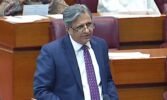The long-anticipated 26th Amendment Bill, designed to implement judicial reforms that have sparked significant debate between the government and the opposition, particularly the Pakistan Tehreek-e-Insaf (PTI), was finally introduced in the Senate on Sunday evening following weeks of political negotiations.
The bill was presented just hours after the federal cabinet approved the draft amendments, which had been pending for weeks. With voting now completed, the Senate has approved all 22 clauses of the bill.
Political leaders continued to discuss the constitutional amendments late into Saturday night, facing uncertainty over the bill’s introduction due to strong opposition from the PTI.
Originally, the coalition government planned to present the legislation the previous day but postponed it at the request of Jamiat Ulema-e-Islam-Fazl (JUI-F) chief Maulana Fazlur Rehman, who stated that his party would support the 26th Amendment after receiving a response from the PTI.
The PTI has repeatedly voiced concerns about the proposed judiciary-focused legislation, which includes establishing a fixed three-year term for the Chief Justice of Pakistan (CJP), creating constitutional benches, restructuring the Supreme Judicial Council, and forming a Special Parliamentary Committee to recommend candidates from among the three senior-most judges for the CJP’s appointment.
During the Senate session, Federal Minister for Law Azam Nazeer Tarar announced that a consensus had been reached among the government’s allied parties and JUI-F on the draft constitutional amendment bill.

As part of the government’s efforts, a special parliamentary committee, which included representatives from all political parties, discussed the proposed amendments.
The law minister urged Senate Chairman Yusuf Raza Gilani to allow him to present the 26th Amendment Bill as a supplementary agenda item, highlighting that the procedure for appointing judges had been altered in the 18th Amendment.
In response to opposition criticisms, Tarar stated that CJP Qazi Faez Isa had shown no interest in extending his tenure, affirming that he would retire as scheduled.
The law minister explained that one of the draft amendments involves the creation of constitutional benches within the Supreme Court. He emphasized the need for judicial reforms and referenced a former chief justice known for frequently issuing suo moto notices, stating, “Our courts have sent elected prime ministers home.”
Tarar detailed that the proposed constitutional benches would be formed by a judicial commission that would also assess judges’ performance. He noted that the term for the top court would be limited to three years, with the CJP selected from among the three senior-most judges.
To enhance the role of the legislature in appointing judges, Tarar mentioned that a 12-member parliamentary committee with a two-thirds majority would appoint the CJP. The updated draft also allows for the establishment of constitutional benches at the provincial level. The minister stressed that the bill aims to provide prompt and affordable justice to the public and urged the Upper House to support it.

PTI Senator Barrister Ali Zafar, addressing the Senate, referred to the Constitution as a “social contract” uniting the nation, warning that without consensus, the Constitution would falter. He highlighted that the Constitution is based on the people’s consent and amendments should reflect that.
Zafar cited Article 58(2)(b)—which empowers the president to dissolve the government—pointing out that both PML-N and PPP governments were adversely affected by this amendment. He emphasized that amendments made without consensus could undermine democracy.
He reiterated that PTI’s parliamentary committee had decided against voting on the constitutional amendment, stating, “We have gathered signatures from all our members […] If any member votes, don’t count it.”
While he expressed concerns over the draft’s urgency before the chief justice’s retirement on October 25, Zafar noted “serious mistakes” in the proposal that needed to be addressed.
He clarified that the bill does not establish a constitutional court but rather creates constitutional benches and criticized the government for retaining control over the judicial appointment process, leading to confusion over case management.

PPP Senator Sherry Rehman criticized the opposition for failing to propose any amendments during ten committee sittings, asserting that their actions were not an “attack” but a way to reclaim parliamentary rights. She praised Bilawal Bhutto-Zardari for his efforts in building a consensus on the constitutional package.
Following speeches, the House voted to proceed with the constitutional amendments, passing the motion by a majority. Before the vote, opposition lawmakers called for PML-N leader Rana Sanaullah and the Attorney General of Pakistan to be removed from the House, but treasury senators maintained their right to remain.
Initially, the PTI parliamentary committee announced a boycott of the voting process, but Chairman Barrister Gohar later stated that the party lawmakers would participate. Ultimately, Gohar confirmed that PTI would abstain from voting on the amendment in parliament.
He expressed respect for Maulana Fazl’s support against the constitutional package and reiterated that Imran Khan would have the final say on party decisions, emphasizing the need for more consultations given the seriousness of the legislation.
JUI-F chief Fazl remarked that they had “defanged the black snake overall” concerning the draft amendments, noting that although the PTI had objections to the process, they had the right to oppose based on their past experiences.
In a cabinet session, Prime Minister Shehbaz Sharif praised the federal cabinet’s decision to move forward with the 26th Amendment as a significant achievement for Pakistan’s development and stability. He congratulated the nation and reaffirmed the government’s commitment to public welfare and constitutional integrity.
What is the Constitutional Amendment?
The judiciary-focused constitutional package proposes various amendments, including a fixed three-year term for the CJP. A special parliamentary committee representing all political parties has been discussing several proposals, such as the establishment of constitutional benches, restructuring the Supreme Judicial Council, and creating a Special Parliamentary Committee to recommend candidates for the CJP’s appointment from among the three senior-most judges.



